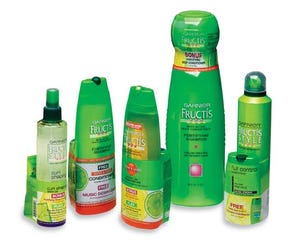
It's only fitting that Garnier Fructis haircare products from Maybelline are in bright green bottles, given its campaign to use sustainable packaging. The cosmetics giant teamed up with flex-pack converter Packstar Flexible Packaging (www.packstargroup.com) in Buffalo, NY, to create polylactide-acid-based (PLA) shrink labels for the shampoo and conditioner containers.
“Maybelline jumped in head first,” says Andy Sharp, chief executive officer of Packstar. “They chose with to go with PLA labels because it was easier to add sustainability in its manufacturing process with labels than with bottles.”
In 2007, Packastar produced 20 million PLA labels for Maybelline. Because the customer switched to using PLA instead of a polyvinyl chloride (PVC) or polyethylene terephthalate glycol (PETG) label substrate, it saved the equivalent of 17,500 gal of gasoline, according to Sharp's report from Packstar film provider Plastic Suppliers (www.plasticsuppliers.com).“This is a good true-life situation that really shows the quantifiable savings of oil,” Sharp says.
Along with Maybelline, Packstar also ran 1 million PLA shrink labels for a Coca-Cola campaign in Mexico in 2006. Coke also used PLA shrink labels for its World of Coke interactive stores this past summer and will continue to do so. The converter, which now has 20 percent of its business coming from PLA projects, plans to continue working with Maybelline, Coke and others, to expand its sustainable labels and packaging business up to 50 percent in the next two years.
Seeds of sustainability
In two and a half years, Packstar has modified its machinery to work with PLA and has done significant research and development to find end markets and uses for PLA. It is now looking to further expand its sustainable packaging expertise by looking into compostable inks to make a fully-compostable label.
It all began at PACK EXPO Las Vegas 2005 when Packstar heard about Natureworks (www.natureworksllc.com), which makes the PLA resins. Natureworks provided Packstar with a life-cycle assessment that goes from the plant to the pellet/resin and showed that creating PLA shrink film produced fewer carbon-dioxide emissions and required less energy than making shrink film from PETG or PVC.
Devoted to moving its converting operations from polyester to PLA and changing the impact of PLA on the packaging market, Packstar pursued cobranding with Natureworks. The converter also cobrands with Plastic Suppliers, which extrudes the Natureworks resins and creates the EarthFirst® film for Packstar.
“We've been very excited (about sustainability) and learned to set our converting operations to run (PLA),” Sharp says.
PLA takes root
Packstar began testing the film on its existing equipment and making modifications on all its lines so that PLA can be used with all machinery. “Using PLA doesn't require wholesale changes,” Sharp explains, “you just need an understanding of the film and learn to adjust the settings—and at that, you don't have to analyze much.”
Packstar does printing, slitting, seaming and rewinding applications with the PLA. In addition to its renewable characteristics, PLA's other benefits became clear to Packstar after working with the film. The converter found that PLA takes ink very well using flexographic and gravure presses. And because of its rigidity, PLA is not only good as film, but it's also good for building strength in thin-walled plastic containers, Sharp adds.
As an added bonus, PLA can be stored in temperatures up to 104 deg F and will not shrink, but at the same time it takes less heat to shrink it onto a package. “Once it is beyond the 104 deg, it shrinks quickly,” Sharp says. “Once it starts, it keeps going. Not only does it save energy on its production, but it saves energy being used as film.”
Branching out
Currently, the inks used for shrink-film printing are typically not recyclable. Packstar, however, is looking to change that. “We are currently looking into compostable inks,” Sharp explains. “We use water-, UV- and solvent-based inks right now. Having fully-compostable inks is the next evolution. There's certain R&D needed, and as the market continues to evolve, the demand (for compostable inks) will force ink vendors to find a solution.”
To stay in touch with the latest research findings regarding sustainability, Packstar joined the Sustainable Packaging Coalition (www.sustainablepackaging.org), which studies the different theories about sustainability, how to put them into practice and how to capture savings.
“People want the truth, what is known fact and what is theory, and what the impacts of these are,” Sharp says. “We can't convert the mass of consumer products to materials that require less petroleum, but it has to start somewhere. We feel we're doing our part.”
Perhaps like PLA shrink-film shrinking, once it starts, it keeps going. PLA has been Packstar's fastest-growing segment with double-digit growth in the last seven years, and Sharp sees no slowdown.
More information is available: |
Packstar Flexible Packaging, 716/853-1688. www.packstargroup.com. |
Natureworks, 800/664-6436. www.natureworksllc.com. |
Plastic Suppliers, 800/722-5577. www.plasticsuppliers.com. |
Sustainable Packaging Coalition, 434/817-1424 x309. www.sustainablepackaging.org. |
About the Author(s)
You May Also Like


